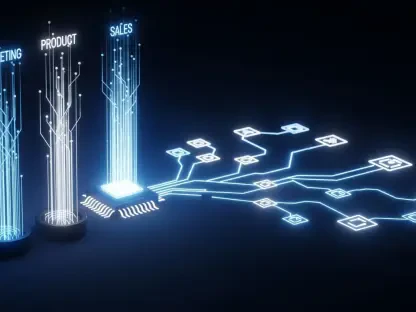What if the everyday items on store shelves, from toothpaste to soda, were crafted not just by human hands but by algorithms and robotic precision? In today’s fast-evolving world, technology is no longer a mere support system in the Consumer Packaged Goods (CPG) and retail sectors—it’s the driving force behind a seismic shift that is reshaping how products are created, distributed, and sold. This transformation offers a glimpse into a future where efficiency and innovation reign supreme. Dive into the digital wave that’s changing the game for brands and shoppers alike.
The Critical Role of Tech in Today’s Market
At the heart of this revolution lies a pressing reality: technology is essential for survival in an industry grappling with supply chain hiccups, heightened consumer demands, and a growing call for sustainability. Digital tools provide the means to streamline operations, anticipate market shifts, and reduce environmental footprints. Companies that hesitate to adopt these advancements risk losing ground in a fiercely competitive landscape where speed and customization are non-negotiable.
The stakes are high as global pressures mount. Retailers and CPG firms must navigate a maze of challenges, from ensuring timely deliveries to meeting ethical standards. Technology stands as the cornerstone for addressing these hurdles, enabling businesses to pivot swiftly and maintain relevance in a consumer-driven economy.
Cutting-Edge Innovations Leading the Charge
A wave of technological breakthroughs is propelling the industry forward, with artificial intelligence (AI) taking center stage. HanesBrands, for instance, has partnered with Infosys to overhaul operations using the Live Enterprise Automation Platform (LEAP) and Topaz framework, a move announced earlier this year. Meanwhile, Coca-Cola’s collaboration with MIT’s Generative AI Impact Consortium tackles global issues like citrus greening through initiatives such as “Save the Orange,” demonstrating AI’s potential to solve critical agricultural problems.
Automation is another game-changer, especially in supply chains. Southern Glazer’s Wine & Spirits recently unveiled a 375,000 square-foot facility in Louisiana, equipped with state-of-the-art systems from Dematic. Enhanced conveyors and energy-efficient designs have already shown promise in cutting delivery times, highlighting how automation can manage vast distribution networks with precision.
Data intelligence also plays a pivotal role, particularly in pricing strategies. DemandTec’s emergence as a standalone entity this year focuses on AI-driven pricing solutions, while Spins’ acquisition of Datasembly bolsters hyperlocal market insights. These developments empower brands to make informed decisions swiftly, staying ahead of trends and consumer preferences with real-time data.
Industry Perspectives and Tangible Outcomes
Leaders across the sector are vocal about technology’s transformative impact. A Coca-Cola spokesperson involved in the MIT consortium emphasized, “AI is more than a tool; it’s a pathway to solving humanity’s greatest challenges, like safeguarding food supplies.” Such statements underscore the profound potential of these innovations beyond mere profit.
Real-world results further validate this optimism. Southern Glazer’s automated facility has reported a 20% boost in order fulfillment speed, a metric that speaks to efficiency gains. Additionally, feedback from a retail manager at a recent trade event revealed that platforms like Spins-Datasembly have halved the time needed to strategize promotions, showcasing how digital tools translate into practical, day-to-day advantages for businesses.
Strategies for Harnessing Digital Potential
For companies looking to thrive, actionable steps are crucial. Investing in AI for decision-making tops the list—identifying specific bottlenecks in areas like supply chain or product development and applying tailored predictive analytics can yield significant returns. Tools similar to DemandTec’s offerings provide a roadmap for forecasting demand and refining promotional efforts.
Collaboration is equally vital. Emulating partnerships like those of HanesBrands with Infosys or Coca-Cola with MIT can accelerate innovation by combining expertise and resources. Such alliances enable faster integration of cutting-edge solutions, from generative AI to automated systems, into core operations.
Lastly, prioritizing real-time data and sustainable practices is non-negotiable. Platforms offering detailed insights, as seen with Spins-Datasembly, allow for dynamic pricing adjustments, while energy-efficient automation, like Southern Glazer’s model, aligns cost savings with environmental responsibility. Empowering leadership with digital skills ensures these strategies are executed with vision and precision.
Reflecting on a Tech-Driven Journey
Looking back, the journey of CPG and retail through this year painted a vivid picture of transformation, driven by relentless innovation and strategic partnerships. Companies that embraced AI, automation, and data analytics carved out a competitive edge, addressing both operational challenges and broader societal needs with finesse.
As the industry reflected on these advancements, the path forward became clear: deeper investments in scalable, sustainable technologies were essential. Exploring collaborative models to tackle emerging issues, from supply chain resilience to climate impacts, stood out as the next frontier. The story of this sector’s evolution urged a continued focus on blending human ingenuity with digital prowess to shape a more responsive and responsible marketplace.









